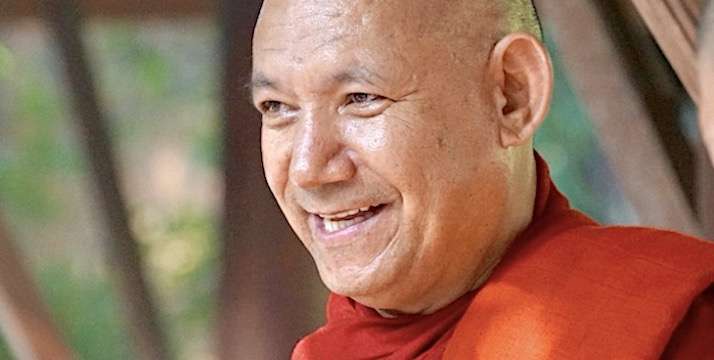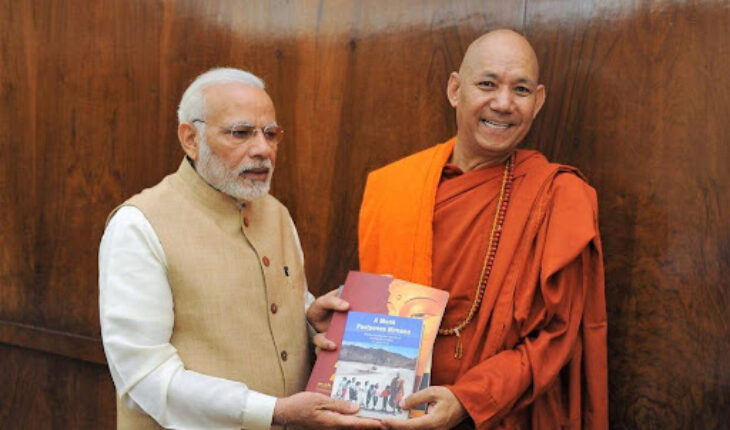
Bhikkhu Sanghasena -Founder, Mahabodhi International Meditation Center, Leh (Ladakh)
With immense relief and joy, we celebrate the recent landmark agreement between India and China on military disengagement along their long-disputed border. This much-anticipated decision brings fresh hope to those who have tirelessly advocated for peace, reconciliation, and cooperation between these two great nations and worldwide. The agreement symbolizes a renewed commitment to non-violence, diplomacy, and lasting peace.
Since founding the Mahabodhi International Meditation Centre (MIMC) in Ladakh, my mission has focused on fostering harmony through humanitarian and spiritual efforts, particularly during local, national, or global tension. Over the years, MIMC has supported countless initiatives centered on peace-building and inter-religious dialogues, seeking to mend divides and cultivate a culture of understanding. To witness this historic commitment between India and China now is profoundly heartening, as it aligns with the principles of truth, compassion, and reconciliation that form the core of our humanitarian work.
This breakthrough alleviates the anxieties of those directly affected by military tension in Ladakh. It offers hope to all who advocate for truth and reconciliation amid our world’s many challenges. A peaceful resolution between India and China is significant for our region and the world. It serves as a reminder that even the deepest-rooted conflicts can be addressed through dialogue and a shared vision for peace.
I sincerely thank both nations’ leaders for their wisdom and steadfast commitment to this outcome. I applaud India’s dynamic Prime Minister Narendra Modi, whose guidance has helped achieve this crucial step towards peace with China, reflecting the strength and resilience within our democratic system. At the same time, I recognize China’s cooperative approach and the effective leadership that has facilitated this meaningful resolution. Such diplomacy, grounded in mutual respect, is essential for maintaining stability and harmony in Asia and beyond.
During my recent participation at the World Buddhist Forum in Ningbo, China, where more than 800 delegates from 73 countries assembled, I spoke on “Hand in Hand for Coexistence and Co-prosperity.” This gathering provided an invaluable opportunity to promote Indian culture and to share the Buddha’s teachings of peace and compassion with global leaders. I stressed the importance of harmony between India and China, which share a profound cultural and spiritual heritage, mainly through Buddhism. Historically, Buddhism has served as a bridge between our nations, fostering unity and mutual respect. I echoed the words of our Prime Minister, who has often remarked that India has contributed “Buddha” (peace) rather than “yuddha” (war) to the world, affirming our nation’s commitment to global harmony.
In my keynote address, I highlighted that maintaining friendship between India and China is not only critical for the stability of the Asian region but also has far-reaching implications for global peace. The shared values of compassion and non-violence, rooted in the teachings of Lord Buddha, provide a guiding light for this path forward. It was inspiring to witness the alignment between our leaders—Prime Minister Modi and President Xi Jinping—who discussed these values during their recent meeting on the sidelines of the BRICS Summit in Russia. This gesture underscores the shared vision for peace, understanding, and cooperation that both leaders are determined to uphold in an increasingly interconnected world.
When hostilities first began along the Indo-China border in Ladakh, my heart grew heavy with concern as a follower of Lord Buddha’s teachings on non-violence. I and my team at MIMC called upon peace-loving individuals worldwide to join us in appealing for a peaceful resolution. Amid escalating tensions and heated political rhetoric, we embarked on a week-long spiritual pilgrimage to Ladakh’s contested border region, driven by a single purpose: to offer prayers for peace and de-escalation. Alongside these prayers, we provided families in this remote region with essential supplies, emotional support, and spiritual counsel during this difficult period.
Additionally, our Mahabodhi Devachan campus extended temporary shelter to elderly and vulnerable individuals affected by the heightened tensions. This experience reinforced our belief in compassion and humanitarian service as powerful tools for healing and restoring hope. In response to the border crisis, we organized the historic “Walk, Work, and Pray for Peace” program in Leh, which united religious leaders in a call for non-violence. The event conveyed a powerful message of solidarity, demonstrating our shared commitment to peace, truth, and harmony in a world often marred by conflict and division.
The peaceful resolution of the Indo-China border tensions marks an essential step toward rekindling the historic ties between our nations. India and China have engaged in cultural exchanges for centuries, mainly through Buddhism, which has imparted messages of peace, compassion, and mutual understanding. This shared heritage can serve as a foundation for renewed friendship, guiding us toward a future of cooperation and unity. Such collaboration between India and China will undoubtedly play a crucial role in shaping the future of Asia and the world, as both nations have immense potential to influence global politics, economics, and social welfare.
In a world fraught with conflict, greed, and mistrust, may this reconciliation inspire us all to rise above our differences and embrace love, compassion, and understanding. Let us continue our prayers and efforts toward lasting global peace, drawing upon the timeless teachings of compassion and non-violence. Together, we can foster a world free from the shackles of war and strife and, instead, be guided by the principles of harmony and coexistence.
I extend my heartfelt appreciation to those who have supported our peace mission, from those who joined us in spirit and action to the leaders of various faith groups who stood with us. Their prayers and moral support have been pivotal in delivering our message to those with the power to enact positive change. I am also deeply grateful to the national and international media for amplifying our call for peace and helping spread our message of harmony.
In conclusion, I thank the Chinese leadership for their cooperative approach to this resolution. As two of Asia’s oldest civilizations, India and China must now join hands in leading the world toward a more peaceful, equitable future. By drawing on the wisdom of our ancient traditions, we can guide our nations—and indeed, the world—toward a future marked by shared responsibility and peace.
May this achievement serve as a shining example for the world, encouraging nations to resolve differences through dialogue and understanding. May peace prevail on Earth!
—
(The author, Bhikkhu Sanghasena, is a Buddhist leader from Ladakh who has dedicated his life to peace, compassion, and humanitarian service. A former Indian Army officer, he embraced monastic life. He founded the Mahabodhi International Meditation Centre in 1986, championing education, healthcare, and social welfare for the underprivileged while sharing Buddha’s teachings globally. Since the Indo-China border tensions began, he has tirelessly appealed to global leaders, advocating for dialogue and peace over conflict.)






